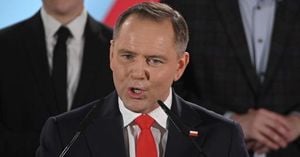The countdown to the 2025 presidential elections in Poland is officially on, with critical dates and campaign events unfolding as candidates gear up for the May 18 vote. The first round of elections will take place on this date, with a potential second round scheduled for June 1 if no candidate secures more than 50% of the votes.
The announcement of the election date was made by Szymon Hołownia, the Marshal of the Sejm, on January 8, 2025. This date is particularly significant as it is the last possible date according to the Polish Constitution, which mandates that presidential elections must occur between 75 to 100 days before the current president's term ends and on a non-working day.
As the campaign heats up, candidates are actively engaging with the public. One of the key figures in this election is candidate Biejat from the New Left party, who recently met with voters in Warsaw. During her meeting, she summarized her campaign and highlighted the core tenets of her program. Biejat is positioning herself as a champion of progressive values, emphasizing her opposition to hatred and violence in politics.
"This is the final stretch; let’s ensure that the leftist proposals are not forgotten any longer. In the first round of elections, we don’t have to vote for the lesser evil; we can vote for the greater good," Biejat urged her supporters, indicating her commitment to mobilizing voters ahead of the elections.
In her campaign, Biejat has made it clear that she stands firmly for legal abortion rights in Poland, stating, "A vote for me is a vote for legal abortion in Poland." This stance has resonated with many voters, particularly those advocating for women's rights.
Furthermore, Biejat has proposed a new tax on the third residential property to combat real estate flipping and speculation. She believes this measure will help stabilize the housing market, which is a pressing issue for many Polish citizens.
Climate change is another critical topic for Biejat. She argues that its impacts are already evident in Poland, particularly in agriculture. "Climate change is not just a distant concern; it is a drought that is already destroying Polish farming," she stated, underscoring the need for a comprehensive energy transformation.
As the election date approaches, various deadlines are set for candidates and voters. The election campaign officially kicked off on January 15, 2025, with the National Electoral Commission (PKW) beginning preparations for the voting process. Candidates had until March 24 to submit applications for the establishment of their election committees, and by March 31, district election commissions had to be appointed.
April 4 marked a crucial date for candidates, as they were required to submit their nominations to the PKW, along with 100,000 signatures supporting their candidacy. The period from April 4 to May 15 is designated for voters to apply for certificates of their right to vote and to request changes to their voting locations.
By April 18, the public will have access to information regarding voting district boundaries, polling station locations, and provisions for voters with disabilities. Moreover, by April 28, all candidates for the presidency will need to be publicly announced.
As part of the electoral process, free election broadcasts prepared by the candidates' committees will be aired on public radio and television from May 3 to May 16. Voters with disabilities or those turning 60 on election day can register for free transport to polling stations until May 5, ensuring accessibility for all citizens.
In the lead-up to the elections, Biejat has also addressed questions from voters regarding various societal issues. One prominent concern was the operation of family courts, to which she proposed that the Ministry of Justice is working on a bill that would redirect some divorce cases to civil registry offices, thereby alleviating the burden on the courts.
Additionally, she emphasized the importance of protecting the rights of the elderly, referencing her party's initiative to implement a 'safe senior' bill. This legislation aims to prohibit the buy-out of communal flats at discounted rates starting in 2027, while also allowing seniors over 65 to sell their flats to the municipality at market price, providing them with immediate financial support.
As the campaign progresses, Biejat remains firm in her commitment to her platform, stating, "We must stop them, and I am ready for that." Her rhetoric reflects a broader concern among left-leaning voters about the rising tide of right-wing politics in Poland, particularly figures supported by the ruling Law and Justice party (PiS).
The electoral landscape is shaping up to be competitive, with various candidates presenting their visions for Poland's future. The first round of voting on May 18 will be a pivotal moment, and if necessary, the second round on June 1 will determine the next president.
Ultimately, every Polish citizen aged 18 and over will have the opportunity to participate in this democratic process, provided they present valid identification on election day. The stakes are high, and as the campaign enters its final days, candidates are intensifying their efforts to connect with voters and secure their support.
With the election campaign officially ending at midnight on May 16, the next few weeks will be crucial for all candidates involved. The Polish electorate is poised to make significant decisions that will shape the country's political landscape for years to come.




